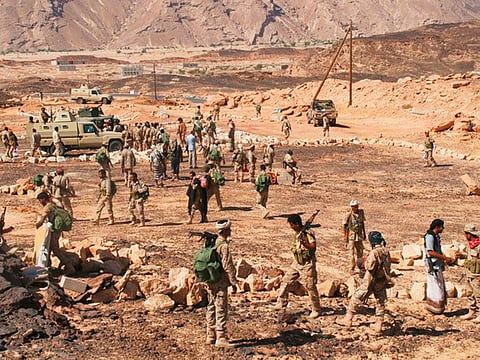In Yemen, US-backed assault on Al Qaida gains steam
US sharing intelligence with its Yemeni and Emirati partners and has a handful of boots on the ground

Al Mukalla: A US-backed campaign involving thousands of Yemeni troops to drive Al Qaida militants out of major strongholds in southern Yemen has gained steam.
The current operation began overnight Wednesday with Yemeni fighters travelling from Hadramout province, where they had been receiving training from Emirati advisers, toward oil and gas facilities in northeast Shabwa province, according to Katherine Zimmerman, a Yemen analyst with the American Enterprise Institute in Washington.
In addition to sharing intelligence with its Yemeni and Emirati partners, the United States is providing mid-air refuelling and overhead reconnaissance for forces involved in the operation, Capt. Jeff Davis, a Pentagon spokesman, said.
It also has a handful of boots on the ground “for intelligence purposes”.
Moreover, the Bataan Amphibious Ready Group, a collection of US Navy ships packed with Marines, is in the region and could assist the operation, as other US amphibious groups have in the past, Pentagon officials said this weekend.
The Yemeni forces, called the Shabwani Elite, are in the process of securing major cities in the province — such as Azzan, Ataq and Jardan — from Al Qaida militants and are also conducting clearing operations in the surrounding areas, officials said.
Images on social media showed the armed Yemeni units rolling through villages in pickup trucks and armoured vehicles flying the South Yemen flag.
“We will see a show of force to secure the key infrastructure in the province — the energy infrastructure, major population centres and checkpoints along the road — but the challenge will be clearing out the rural areas of Shabwa that include quite mountainous terrain, especially where AQAP sanctuaries tend to be,” Zimmerman said, referring to the affiliate, Al Qaida in the Arabian Peninsula.
On Thursday, the Emirati ambassador to Washington, Yousuf Al Otaiba, issued a rare public statement about the Yemeni operation, saying it was “being closely supported by a combined UAE and US enabling force.” Al Otaiba said the mission’s goal was “to disrupt the terrorist organisation’s network and degrade its ability to conduct future attacks.”
Shortly before the arrival of the forces in Azzan, an Al Qaida stronghold, residents reported seeing drones, helicopters and warplanes over the area firing some kind of preliminary warning shots.
“They were firing sound bombs on targets inside and outside the town, as if to tell Al Qaida to go before the arrival of the new forces,” Abdul Sallam, a resident who preferred to be identified by his first names, said.
The militants apparently got the message and began fleeing the town and other neighbouring villages, and since Friday Yemeni forces had reclaimed the town, officials said.
Mohammad Salem Al Qumishi, a commander of a group of forces backed by the UAE, said the troops had seized control of 13 checkpoints and three districts in Shabwa. The militants tried to obstruct his forces by planting landmines and makeshift bombs as they raced out of town.
“They fled to the mountains after failing to stop our forces,” he said.
A local government official, who spoke on the condition of anonymity because he was not authorised to talk to reporters, said the military operation was explicitly designed to secure oil and gas facilities in Shabwa province.
Around the Balhaf liquefied natural gas plant in Shabwa, Khalid Al Adhami, a local army commander responsible for security of the facility, said that Sudanese, Emirati and Yemeni soldiers were protecting it. “The plant is secured from Al Qaida attacks,” he said.
The offensive in Shabwa province, which started last week, includes about 2,000 Yemeni forces backed by dozens of advisers from the United Arab Emirates, and a handful of US Special Operations commandos providing intelligence and planning assistance, US officials said.
It is the largest military operation against Al Qaida fighters in Yemen since Yemeni troops in armoured vehicles and backed by air strikes seized this major port city in April 2016, after the militants had used it as a base from which to storm through the southern part of the country.
The continuing operation is the latest phase of an increased campaign against the Yemeni militants since President Donald Trump took office. It also reflects Trump’s general embrace of President Barack Obama’s strategy to aid local allies fighting insurgents in hot spots like Yemen, Somalia and Nigeria, rather than dispatch large numbers of US troops.
Yemen poses a singular challenge for the West and has captured Trump’s attention from his first days in office. A member of the Navy’s elite SEAL Team 6 was killed in a ground raid in Yemen in January in the first such operation Trump authorised. Al Qaida’s Yemeni branch is widely considered the militant group’s most dangerous worldwide affiliate, with a particular focus on blowing up commercial airliners.
Yemen, one of the poorest countries in the Arab world, has been convulsed by civil strife for more than two years.
Al Houthi rebels ousted the government of President Abd Rabbo Mansour Hadi, the United States’ main counterterrorism partner in the country, and have been fighting a Saudi-led Arab coalition that back Hadi.
Sign up for the Daily Briefing
Get the latest news and updates straight to your inbox


